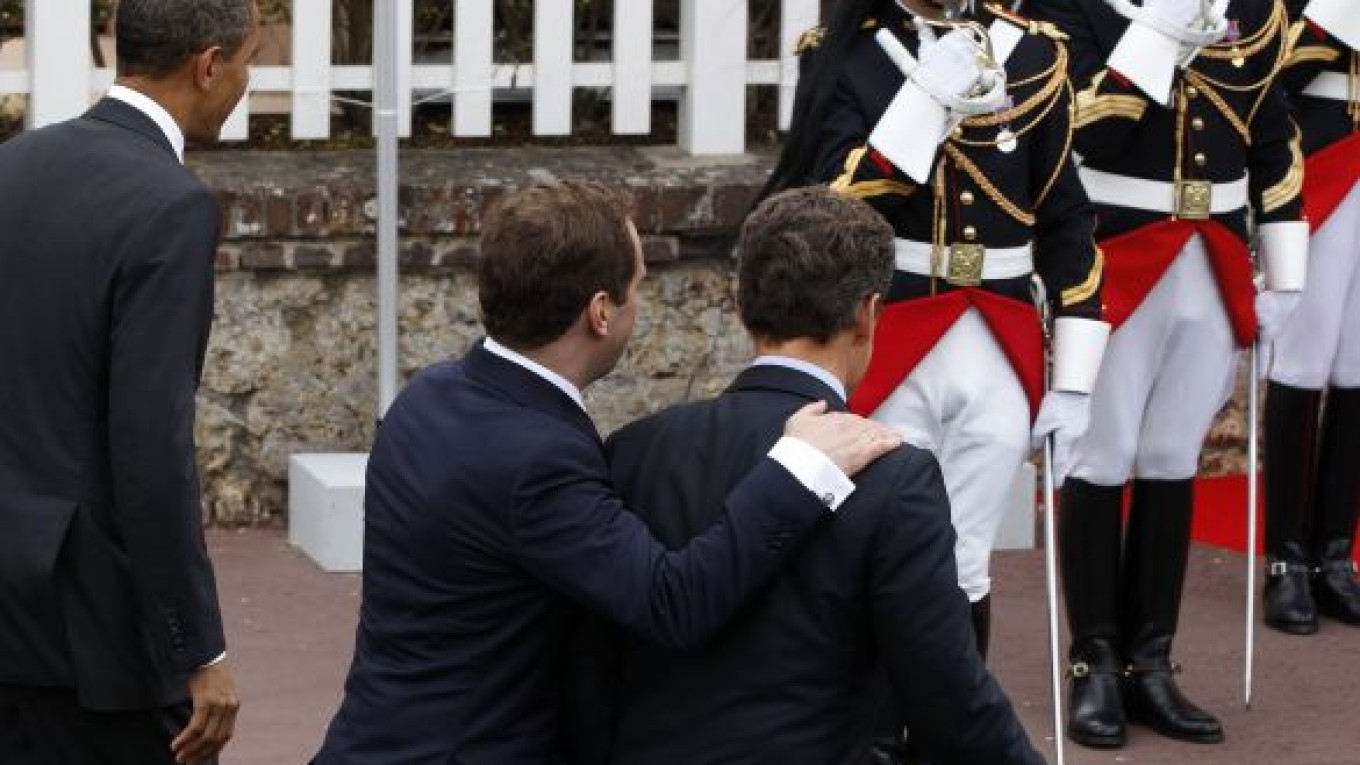Tackling perhaps the most divisive issue in relations between Russia and the United States, Presidents Dmitry Medvedev and Barack Obama agreed Thursday to press ahead in their search for a solution on missile defense in Europe that would satisfy the security demands of both their countries.
The other results from one-on-one talks on the sidelines of a Group of Eight summit in Deauville, France, were equally as modest, with the two presidents mainly affirming existing cooperation in various fields and pledging to expand it.
"This issue will be solved in the future, maybe in 2020, but we should lay the basis for the work for a future generation of politicians," Medvedev said of the missile defense plans after emerging with Obama from their meeting ahead the summit.
Obama said the configuration of the future missile defense shield in Europe should help maintain a strategic balance between the two countries.
The United States and NATO say the missile defense system is needed as protection from a potential missile attack by Iran or North Korea. Moscow has vehemently opposed the plans, saying the deployment of missiles near Russia's borders diminishes the country's capacity for a retaliatory nuclear strike if it is attacked by an overwhelming force.
Russia and NATO agreed in November to consider possibilities for cooperation in building the missile defense together, and the results of a preliminary expert study are to be discussed at a June 8-9 meeting of Russian and NATO defense ministers in Brussels.
Moscow wants the creation of a joint system with dual launch keys. NATO insists on two different systems sharing information about missile threats. Medvedev has warned that failure to accommodate Moscow's concerns will spur a new arms race.
Medvedev and Obama also agreed Thursday to step up talks on Russia's entry into the World Trade Organization, with Obama expressing confidence that membership would be awarded eventually.
The two presidents also discussed stability in North Africa and the Middle East, where Russia has attempted to act as a mediator between conflicting sides.
The situations in Tunisia and Egypt, where entrenched leaders were removed by public uprisings earlier this year, will be a main topic for the G8 summit, as will be nuclear energy safety and a NATO-led military campaign in Libya that Russia says is aimed at killing Moammar Gadhafi.
Another issue to be discussed by G8 leaders is the leadership of the International Monetary Fund, whose managing director Dominique Stauss-Kahn was arrested last week in New York on sex assault charges.
Obama praised Russia for its cooperation in the anti-terrorist coalition effort in Afghanistan, singling out its authorization for the coalition to transport cargo over Russian territory. He also stressed that Moscow and Washington continue their cooperation on nuclear nonproliferation.
Obama called Medvedev "a friend and a partner" who has done a lot to advance and expand cooperation with the United States.
Medvedev responded by saying his good personal relations with the U.S. president have "direct consequences" on the development of ties between the two countries.
Obama added that two more working groups — on modernization and on the rule of law — will be added to the existing 16 groups operating under the umbrella of the U.S.-Russia Bilateral Presidential Commission set up during Obama's first visit to Moscow as president in July 2009.
U.S.-Russian relations improved significantly after the change of guard in the Kremlin in 2008 and in the White House in 2009.
The two countries agreed Thursday to strengthen cooperation on airport and aviation security, on nuclear threats and crisis management and on countering improvised explosive devices.
Prior to the talks with Obama, Medvedev and his administration said Moscow would raise the issue of easing visa rules between the two countries. No reports concerning this issue appeared in the hours after the talks.
Meanwhile, Medvedev, Obama and French President Nicolas Sarkozy adopted a joint statement Thursday calling on Armenia and Azerbaijan to seek a peaceful resolution of the conflict over the separatist Nagorno-Karabakh region.
A Message from The Moscow Times:
Dear readers,
We are facing unprecedented challenges. Russia's Prosecutor General's Office has designated The Moscow Times as an "undesirable" organization, criminalizing our work and putting our staff at risk of prosecution. This follows our earlier unjust labeling as a "foreign agent."
These actions are direct attempts to silence independent journalism in Russia. The authorities claim our work "discredits the decisions of the Russian leadership." We see things differently: we strive to provide accurate, unbiased reporting on Russia.
We, the journalists of The Moscow Times, refuse to be silenced. But to continue our work, we need your help.
Your support, no matter how small, makes a world of difference. If you can, please support us monthly starting from just $2. It's quick to set up, and every contribution makes a significant impact.
By supporting The Moscow Times, you're defending open, independent journalism in the face of repression. Thank you for standing with us.
Remind me later.


